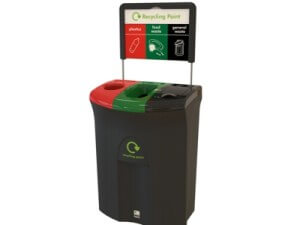 The education sector is becoming more environmentally aware and realising the impact their operations have on the wider community according to a recent Leafield Environmental survey conducted ahead of WRAP Recycle Week.
The education sector is becoming more environmentally aware and realising the impact their operations have on the wider community according to a recent Leafield Environmental survey conducted ahead of WRAP Recycle Week.
The survey reveals that plastic recycling is the big focus for academies, secondary schools, colleges and universities next term. Half of the respondents said they are keen to step up recycling rates for plastic bottles and 41% plan to install dedicated food waste recycling units. Others are keen to start collecting batteries, toner kits and electrical items. Forty percent also believe that introducing outdoor recycling would also have a positive effect on behaviour and encourage students to recycle more.
In a bid to increase environmental awareness, 50% of respondents include special arts projects and interactive recycling activities during lessons and 32% organised special eco-events for Recycle Week. Leafield MD, Phil Maddox said: “The volume of recycling bins to HE and FE premises has increased by 25% in the past year reflecting the importance of efficient waste management systems.
“The Meridian is our best-selling ‘all-rounder’ for this sector. The dual or triple recycle bin is perfect for areas with limited space and waste options include plastics, food waste, cans, paper and mixed recycling.
“The sector is realising the significant environmental benefits as well as cost savings to be made by cutting the volume of waste going to landfill. Installing bins to segregate recycling more efficiently can drive up recycling rates by more than 50% in just a few months.”
The survey also shared some top tips for recycling success. Here are the top 10:
1. Use recycled materials in art, texture and science classes to encourage creativity.
2. Explore recycling processes in science classes to build environmental awareness.
3. Remind students during assemblies or briefings of what can and cannot be included in the recycle bins.
4. Introduce a rota for students to check recycling bins are being used properly.
5. Form an Eco-Team to organise special recycling events and themed projects to create exhibitions and displays for open days, presentations or community projects.
6. Introduce the collection of other materials like batteries, mobile phones or ink cartridges to raise funds for charity or to invest in new recycling bins.
7. Design some ‘Did You Know’ posters with recycling facts and figures and place in key areas.
8. Measure the improvements in recycling rates and report these in a newsletter.
9. Set recycling targets to incentivise students to do more.
10. Use the money saved on landfill costs to fund new recycling bins or environmental awareness field trips.
Leafield survey results
Secondary Schools, Academies, Universities – 60 respondents
Current recycling:
• 98% recycle paper
• 67% cans
• 67% plastic
• 42% glass
• 33% food
Future recycling – what recycling bins are they thinking about buying?
• 48% Plastic
• 44% Paper/card
• 41% Cans
• 41% Food Waste
• 33% Glass
Other included: batteries/toner kits & electrical items.
Other comments:
• 40% said students were extremely likely to recycle more if outdoor recycling units were provided.
• 32% of schools/colleges/unis organised special recycling projects for Recycle Week in June.
• 50% of schools include interactive recycling activities or special arts projects as part of lessons.

